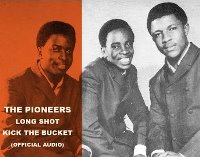
Most sports will incorporate music somewhere whether it be walk in or walk on music for many players or even to back results being revealed, but equestrianism is not one that features particularly highly on the list, but, In 1969, The Pioneers, a reggae group from Jamaica immortalised the sport, but in a sad way.
The Pioneers were one of Jamaica’s top harmony groups and were formed in 1962 by brothers Derrick and Sydney Crooks along with their friend Winston Hewitt. The line-up varied at times and were anything from a duo, trio or quartet, but the brothers were the mainstays. In 1965, they were signed by the legendary producer Leslie Kong to his Beverelys label and Hewitt was replaced by Glen Adams. Two years later, they signed to the Caltone label and with Adams and Derrick gone they needed a replacement.
Crooks said, “When I was about to voice the song I looked outside the studio and I saw a little boy sitting on a stone. I said ‘Hey, come here man, can you sing?’ He sang the harmony for Give Me Little Loving and his name was Jackie Robinson. After that I said to him ‘You are one of the Pioneers from today’ and he became the lead singer of the Pioneers” and from that day, Robinson is still a Pioneer, so to speak.
Caymanas Park is the only race track in Jamaica and is located in Gregory Park in the St Catherine area of Jamaica and is a former sugar estate which was owned by brothers George and Charles Ellis who made huge amounts of money from sugar and, sadly, exploited slavery. In 1959, it was bought by Alexander Hamilton who hired Bartholomew Vicens-Oliver to design and turn it into a racetrack and it was opened in August that year.
In 1968, Robinson and Crooks wrote a song called Long Shot (Bus Me Bet) which, apart from the legendary horse Long Shot, it namechecks other runners, State Chief Minister, My Son, Drumbeat and Chagga Chagga Warrior which had won the race just before the track was recorded. Long Shot wasn’t the strongest nor the fastest horse, but he did have stamina and, to quote the lyrics, ”im whip ‘im, ‘im lash ‘im but ‘im couldn’ bus’ de tape,’ meaning Long Shot was heavily whipped and lashed which kept him going, something which seemed to be the norm in horse racing especially in Jamaica and ‘im couldn’ bus’ de tape’ meaning he couldn’t quite get to the finishing line.
Long Shot’s next race, his 203rd, was the fateful one because on the home straight he ran close the rail and just a few yards short of the winning post, he dropped down dead. His competitors in the race were Star bright, Combat and Corazon with Long Shot at the rear, but as they neared the finishing line, Combat fell then Long Shot. There was upset for those who had money on them and, as the song says, ‘All we money gone a hell’.
Long Shot Kick De Bucket was, according to the Trojan record label, penned by Gordon/Crooks/Robinson, the latter two we know about, but who was Gordon? Well, that turns out to be an erroneous credit which is another thing that happened a little too often with record labels. Gordon should have read George Agard who was producer Leslie Kong’s resident piano player who had added something to the song and thus should have received a proper credit. He also happened to be Desmond Dekker’s half-brother.
The song opens with the same bugle call that was used on Long Shot (Bus Me Bet). This bugle call is known as Call to the Post and has been used in horse racing since the 18th century. Kevin O’Brien Chang is a Kingston-born historian and commentator who co-wrote Reggae Routes: the Story of Jamaican Music, with Wayne Chen and he explained that it was Leslie Kong who first learned of the death of Long Shot and called in the Pioneers to write and record a song about it.
The same week Long Shot raced and died, another horse called Rameses, who had been voted ‘Horse of 1968′, also died. Sticking to a winning formula, the Pioneers recorded a song about him too called Poor Rameses and that also opens with a slightly different bugle call. It transpired that Rameses died of a heart attack. Both Rameses and Long Shot have a trophy named after them that are awarded annually.
Long Shot Kick De Bucket peaked at number 21 in November 1969, it did, however get further recognition when it went to number one in 1980 after the Specials included a cover on their Special AKA Live! EP. Two years passed until the Pioneers had their second hit – a cover of Jimmy Cliff’s Let Your Yeah Be Yeah which peaked at number five. The same year Long Shot charted, the Pioneers recorded another song called Starvation which was not a hit for them , but was covered in 1985 by a charity ensemble also called Starvation and made up of members of the Pioneers, Madness, Specials and UB40. It peaked at number 33 and profits went to the famine in Ethiopia appeal on the back of Live Aid. The track was produced by the Specials’ Jerry Dammers.
The Pioneers managed one further hit in January of 1972 when another Jimmy Cliff song, Give and Take which limped to number 35, but it did become the title of their second Greatest Hits collection in 2002. In 1976, they teamed up with Eddy Grant and recorded the album Feel The Rhythm.
The Pioneers, who are still going with the same three members – Crooks, Robinson and Agard but gave up recording songs about deceased four-legged mammals realising they were flogging a dead horse.